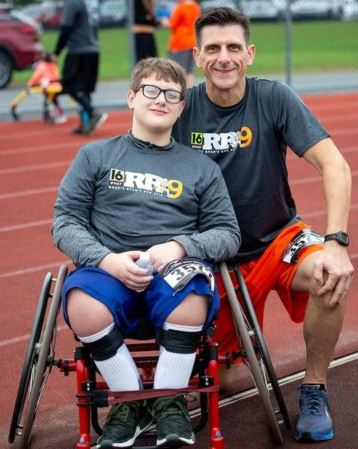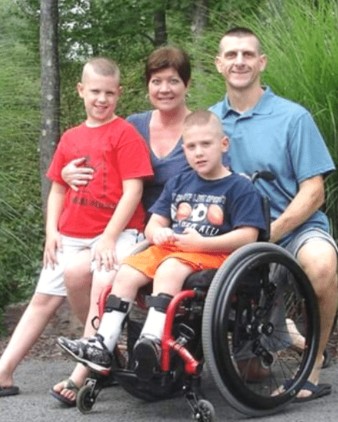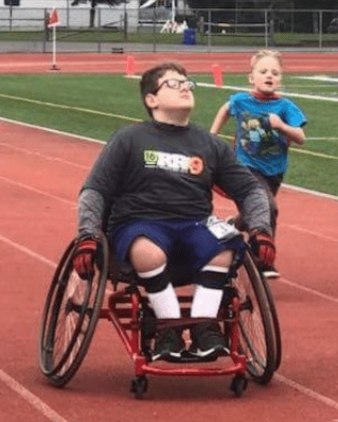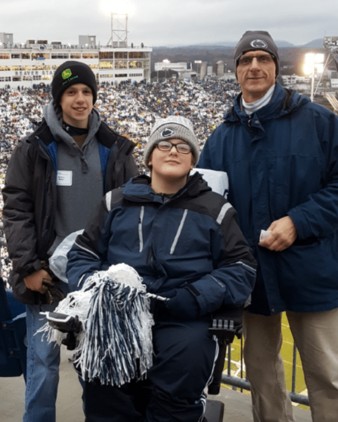
Max Malec was born with spina bifida, but he doesn’t let that slow him down one bit. He and his dad Mike look at life by emphasizing ability over disability. We’d love for you to meet Max and his dad and find out more about their lives.
In 2006, the Malec family prepared for the arrival of their second child. However, they had no idea that their baby boy’s spine wasn’t developing normally in the womb.
When little Max finally arrived in the world, his parents, Mike and Mary, became one of the many families in America who have a child born with spina bifida each year.

Emphasizing Ability Over Disability as Parents of a Child with Spina Bifida
Many parents with a new baby who has a special condition like spina bifida go through many emotions, often all at once. Of course, they are overwhelmed with joy to have a new child. But since many parents want the best for their children, they may also have some worries.
For example, will their child be able to grow up and stay healthy? Will they be afforded the same opportunities as other kids? Can they go to school and participate in sports and other activities? Will they be treated differently?
Despite any fears, Mike and Mary were determined to give Max the best care and love a boy could get. Plus, they knew the best approach was to focus on ability over disability. They would focus on all the things Max could still do.
Mike says that from day one, they were “fighting for Max with his healthcare, education, and physical participation in all activities.”

Facing New Challenges Head-On
Max may have been born with Spina Bifida, but his condition hasn’t held him back yet. That’s not to say that Max and his family haven’t gone through some serious hardships.
Early on, they realized they were going to need a home that would accommodate Max, so they had to sell their house and build a new wheelchair-accessible one.
On top of that, the Malecs received some devastating news. Mary was diagnosed with Stage 4 colon cancer. After battling that cancer for 3 and a half years, Mary tragically passed away when Max was only 9 years old.
Mike, his oldest child Mickey, and Max faced the hardest task yet: learning to live without Mary.
Raising a Child with Spina Bifida as a Single Parent
Having a child with a disability can be tough for any family. It can be even harder on a family with a single parent.
Among juggling the kids’ busy schedules with work, people with kids who live with special medical conditions can also face additional financial hardships. Often, they must pay for more doctor’s visits, prescriptions, and medical supplies. Wheelchair-accessible homes and other modifications for easier accessibility can also be more expensive. Right now, Mike is working toward getting a wheelchair-accessible vehicle for Max now that he’s getting older, too, which can be a pretty big expense on top of normal day-to-day bills.
Although “every day is challenging to keep up with two young boys, especially one with special needs,” he never gives up.
“You have to be careful in what you can and can’t encourage your child to do,” Mike advises when it comes to sports and physical activities for your disabled child. However, if your child wants to try to do something other kids can do, Mike says with a little searching and advocating for your kid, there is often a way they can participate too.

“Keep searching and asking people to let them try some way, shape, or form to make it happen. Contact any local special needs organizations that can provide services, grants, and help in any way,” says Mike.
A few great organizations and communities for parents and children with Spina Bifida include:
Connecting with groups like these may help you find support among other families, participate in fun adaptive activities and events like Spina Bifida Association’s nationwide Wall-N-Roll events, and more.
Rolling Forward and Staying Active
Early Love for Sports
When Max was born, Mike and Mary had made a vow to one another that they would keep Max healthy and involved in as many activities as he could try.
At 6 months old, he began water therapy and learning to swim. Together, he and his parents all played football by crawling on the floor of their home.
To this day, Max still loves playing sports, especially when he can score some points or even snag a trophy. He enjoys competition and meeting new people through physical activity. Whether he’s on the field or the ice, people see him as just one of the other players.
If he had to pick a favorite sport, he’d choose football although he also participates in sled hockey, baseball, and wheelchair soccer for the Lackawanna County Challenger League.
For the past 5 years, he has attended Camp Spifida, which is an awesome summer camp full of physical activities and fun opportunities for children with special needs.
For other kids living with a condition like Spina Bifida, Max loves to share this positive advice: “Treat your disability like an ability. Don’t let any discouragement get in the way of what you want to do.”
Max’s Big Dreams
Like any other 12-year-old boy, Max enjoys playing video games, hanging out with his friends, and watching and making YouTube videos. He has hopes of becoming a YouTube video star someday.
Max also dreams of being able to play football at a higher level, maybe even at a college or in the pros. He also hopes to make it to the Paralympics someday.

Mike supports both of his children to the fullest, hoping they complete their education with high grades and reach the potential they haven’t even realized yet.
They love spending time together as a family, whether playing catch football or just enjoying a treat like ice cream or popcorn on the couch. Mike says God plays a huge role in their lives, too. They often pray together and give thanks as a foundation for overcoming whatever new challenges may come their way.

Catheterization As Part of Daily Life with Spina Bifida
Many children and adults living with Spina Bifida have to eventually learn to self-catheterize. When it comes to having to use catheters, Max doesn’t shrink from the challenge.
“Don’t be scared to use catheters,” Max says. “It’s not as bad as you think.”
Many people of all ages, from newborns to senior citizens, use catheters to manage their bladder conditions every day. We’re glad to see Max letting people know that intermittent catheterization is kind of like sports; with enough practice, you might just become a pro at it.
Mike shares, “Prior to using 180 Medical, we had used numerous DME suppliers around the Scranton area with dissatisfaction. Each company started out nice but eventually deteriorated with customer service and insurance fraud issues, leaving us unhappy and moving on to another company. I am so happy to have found 180 Medical, and I appreciate every phone call I have with you and how well we are treated. I can’t thank you enough, and I always recommend you to others.”
We’re proud to provide personalized service, top-quality products, reliable shipping, and the best product knowledge in the industry. If your child needs pediatric-length catheters, related incontinence supplies, or ostomy products, feel free to contact 180 Medical.
Max and his dad, Mike, are amazing examples of what a great family can be despite the challenges they’ve faced.
We’re sure Max will go on to achieve some amazing things in his life because of his family’s unconditional love and support, his positive attitude, and his competitive drive.
